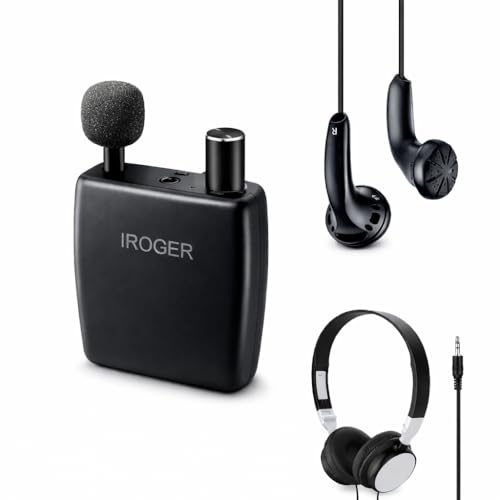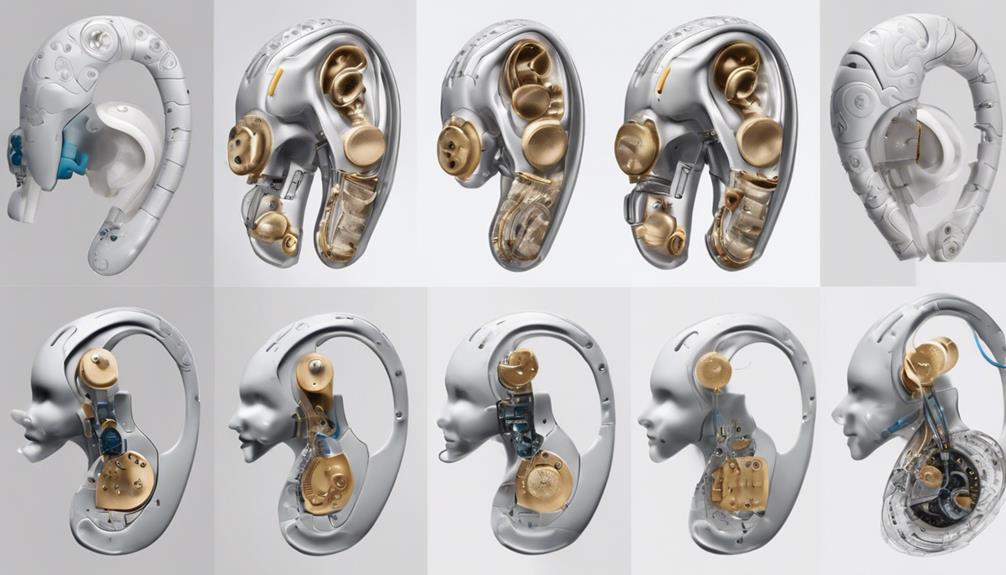Have you ever considered how cochlear implants can transform the lives of babies with hearing loss?
The journey of navigating through cochlear implantation for little ones is a complex but incredibly rewarding one.
From understanding the process to ensuring success post-implantation, there are essential considerations every parent should be aware of.
Through this guide, we shed light on key aspects that can make a significant difference in your child's hearing health.
Key Takeaways
- Early cochlear implantation in infants enhances auditory awareness and language skills.
- Regular monitoring and follow-up care optimize implant benefits and address any issues.
- Family involvement and early intervention services support infants' adaptation and language development.
- Surgery, recovery, and post-operative care are crucial for successful cochlear implant outcomes in infants.

IROGER Hearing Amplifier for Seniors, Personal Sound Amplifier, Smart Auto-Gain, Directional Microphone, Rechargeable with 120-Hour Battery, Headphones & Earbuds Included
Smart Auto-Gain Control – Enjoy crystal-clear sound at all times. iRoger automatically balances audio levels to enhance voices...
As an affiliate, we earn on qualifying purchases.
Understanding Cochlear Implants for Infants
When considering cochlear implants for infants, it's crucial to understand how this technology can transform their auditory experience and pave the way for enhanced language development. For infants with severe to profound hearing loss, cochlear implants offer a lifeline to the world of sound. Early implantation, even as young as 9 months old, can greatly impact their auditory awareness and speech perception abilities. These implants work by directly stimulating the hearing nerve, allowing infants to interpret electronic signals as sound. By providing this vital connection, cochlear implants lay the groundwork for improved language outcomes in these young ones.
Through cochlear implants, infants have the opportunity to learn to distinguish voices, appreciate music, and engage more fully with their surroundings. The journey of adjusting to hearing through electronic signals may seem daunting, but the potential for these little ones to thrive and develop language skills is immense. As caregivers and professionals, it's our privilege to support these infants on their path to a rich auditory world.

Neosonic Rechargeable Hearing Amplifier to Aid TV Watching and Conversation, Wireless Neckband Headphones for Seniors & Adults, Remote Microphone Noise Cancelling - NW10 Pro
BACKGROUND NOISE REDUCTION - Equipped with a wireless external microphone, the NW10 Pro allows you to place the...
As an affiliate, we earn on qualifying purchases.
Benefits and Risks of Cochlear Implants

Considering the benefits and risks of cochlear implants is essential in making informed decisions for infants with severe to profound hearing loss. Cochlear implants offer significant advantages, including improved auditory awareness, speech understanding, and language skills. For infants, early implantation can lead to near-normal language development and faster progression in speech intelligibility.
However, it's crucial to be aware of potential risks such as surgical complications, although rare, they could include issues like infection or device malfunction. These risks need to be balanced against the benefits provided by cochlear implants. By bypassing damaged parts of the ear and directly stimulating the hearing nerve, these implants help in interpreting electronic signals to the brain, aiding in language development.
To ensure the optimal function and development of infants with cochlear implants, regular monitoring and follow-up care are necessary. These measures contribute to the overall success of the implant in enhancing the child's auditory abilities and language skills.

Joanbro Personal Sound Amplifier for Seniors, Voice Enhancement Devices, Pocket Sound Amplifiers for Elderly People, Adults, 50dB Gain, with Headphones & Earbud, 3 Types Mics, 3 Tone, Volume Control
SUPERIOR PERSONAL SOUND AMPLIFIER: Applying noise cancelling, automatic gain control and advanced amplifying circuit, this sound amplifier device...
As an affiliate, we earn on qualifying purchases.
Process of Getting a Cochlear Implant
After evaluating the benefits and risks of cochlear implants for infants with severe to profound hearing loss, the next step involves understanding the process of getting a cochlear implant. Here is a breakdown of what to expect:
- Comprehensive Evaluation: Infants are assessed by a team of specialists to determine their candidacy for a cochlear implant, including audiologists, otolaryngologists, and speech-language pathologists.
- Medical Assessments: Various tests, including hearing evaluations and imaging studies, are conducted to ensure proper cochlear anatomy for surgical implantation.
- Surgical Implantation: The procedure is performed under general anesthesia, with electrodes placed in the cochlea and an external sound processor fitted behind the ear to receive and process sound signals.
- Post-operative Care: Infants require regular audiological follow-up appointments for programming adjustments, rehabilitation, and monitoring of speech and language development progress. Family involvement and early intervention services play a vital role in supporting the infant's adaptation to the cochlear implant and optimizing language outcomes.

Portable Digital Video Magnifier, Electronic Reading Aid 5.0 Inch with Foldable Handle for The Visually Impaired Macular Degeneration Low Vision, 2X-32X Times Zoom 26 Color Modes
【High Power Magnification】This 5.0 inch portable magnifier reading aids provide 2X-32X zoom magnification, the unit has been an...
As an affiliate, we earn on qualifying purchases.
Surgery and Recovery for Infants

During the delicate period of surgery and recovery for infants undergoing cochlear implantation, meticulous care and attention are paramount to ensure optimal outcomes. Cochlear implant surgery in infants involves the precise placement of electrodes within the cochlea and securing the receiver/stimulator to the skull. While the procedure offers the potential for improved hearing, there are risks to consider, such as temporary or persistent numbness, tinnitus, and balance issues.
Following surgery, infants undergo a healing period of about four weeks before the implant can be activated. Post-operative care is crucial, with regular audiological visits necessary for programming adjustments and progress monitoring.
To safeguard the well-being of infants with cochlear implants, ongoing monitoring is essential to promptly address any signs of infection or complications. By providing attentive care and support during this critical phase, we can help ensure that these young patients have the best possible outcomes and a smooth transition into a world of sound.
Ensuring Success With Cochlear Implants
To ensure the success of cochlear implants in infants, early intervention and consistent post-operative care are essential components. Here are some key factors that contribute to the positive outcomes of cochlear implants in infants:
- Early Implantation: Implanting cochlear devices in infants under 12 months is critical for optimal results, as it allows the brain to develop speech perception and language skills more effectively.
- Timely Intervention: Prompt action and appropriate post-operative care are crucial in maximizing the benefits of cochlear implants for infants, ensuring they receive the support they need during this critical stage of development.
- Follow-Up Appointments: Regular check-ins and adjustments are necessary to fine-tune the implant settings and address any issues that may arise, promoting continued progress in speech and language development.
- Family Involvement: The involvement and support of family members are vital in creating a nurturing environment that fosters the child's success with their cochlear implants, encouraging communication and growth.
Frequently Asked Questions
What Factors Are Important to Consider a Child for a Cochlear Implant?
When considering a child for a cochlear implant, important factors include the severity of their hearing loss, limited benefit from hearing aids, and their speech perception abilities.
The child's age, hearing aid usage, and speech performance are crucial in the decision-making process.
Evaluating candidacy involves a comprehensive assessment by a team of experts to determine if a cochlear implant is the best option for the child's hearing needs.
What Age Can an Infant Get a Cochlear Implant?
We can confirm that infants can receive a cochlear implant as early as 9 months old.
Early implantation before 12 months is common for infants with severe to profound hearing loss. Research supports that better outcomes are seen in infants implanted before 12 months.
Cochlear implants can benefit infants who haven't yet developed spoken language, aiding in early language and auditory development.
What Is the 60 60 Rule for Cochlear Implants?
We understand the 60 60 rule for cochlear implants as achieving 60% sentence recognition scores in the implanted ear with a 60 dB signal-to-noise ratio. This benchmark helps assess how well cochlear implants improve speech understanding in noisy environments.
Meeting this rule shows successful adaptation to the implant and enhanced speech perception abilities. Clinicians use it to evaluate cochlear implant success based on speech recognition in challenging listening conditions.
When Should Deaf Babies Get Cochlear Implants?
We believe deaf babies should get cochlear implants as early as possible for optimal outcomes. Early implantation can lead to improved speech and language development.
Research suggests that children implanted before 12 months tend to achieve faster language acquisition. Timely intervention is crucial to maximize the benefits of cochlear implants.
Therefore, it's recommended that deaf babies receive cochlear implants at a young age to support their communication and language skills.
Conclusion
As parents, we understand the overwhelming decision-making process when it comes to cochlear implants for infants. Remember, the benefits far outweigh the risks, and early intervention is key.
Trust in the process, lean on support systems, and know that your child's journey to hearing success is worth every step. With the right resources and guidance, you'll be amazed at the incredible strides your little one will make.
The future is as bright as the sun!










